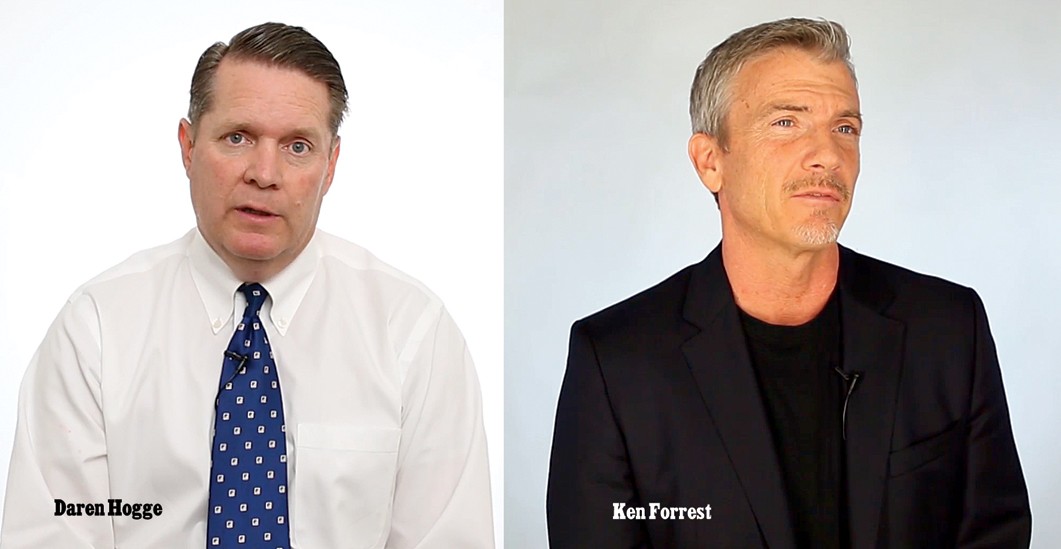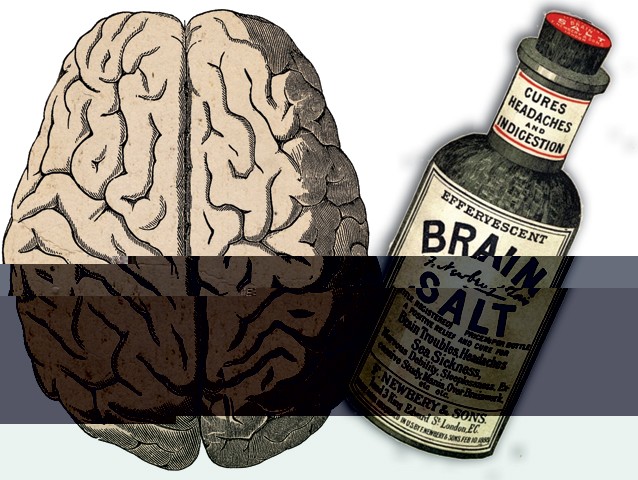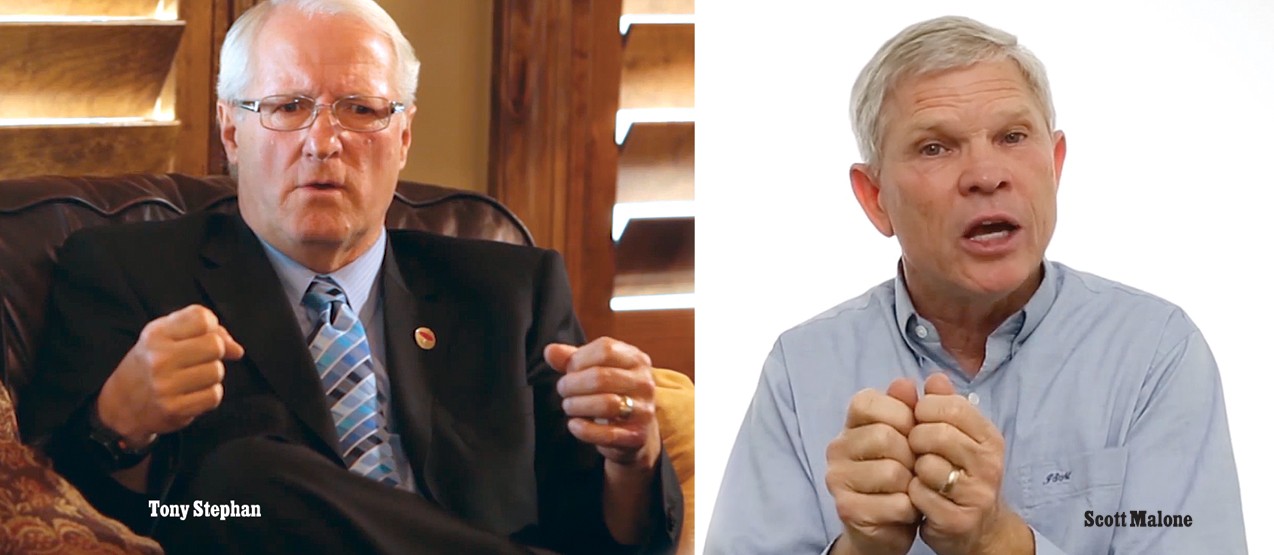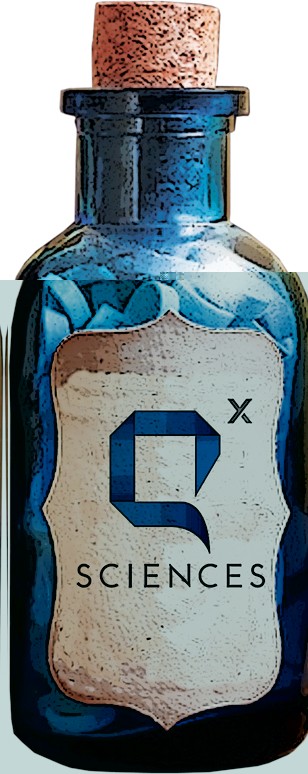
At an October charity walk in Salt Lake City’s Liberty Park, a cheerful woman is stopping passersby to tell them something miraculous:Â “It’s for schizophrenia, it’s for bipolar, depression, autism, ADHD, ADD, SAD, OCD—any type of mental illness, these vitamins help.”
Nearby, kids chase balloons while families line up for hot dogs and cookies. Other tents and tables offer information about mental-health services to attendees of the annual walk, held by the National Alliance on Mental Illness. The event, an effort to fight the stigma of mental illness, is for those whose loved ones are dealing with a mental-health issue or who are living with one themselves—and for those who live only with the memories of those lost to the darkness of depression and suicide.
And at the Q Sciences tent, a woman is holding out a light in the darkness, an all-natural supplement that can treat “any mental illness.”
“It’s a vitamin that you take instead of taking your prescription meds,” the woman says with an enthusiastic smile.
This seeming miracle product is a micronutrient formula called EMPower Plus Q96, designed to provide vitamins that, the woman says, are lacking in the brains of those with mental illness.
She cites her husband as a success story; he went off his bipolar medication, thanks to the supplement.
“My 9-year-old has ADHD and I’ve taken him off his meds, he sleeps better and his behavior is the same as if he was on his prescription,” she says.
Yes, EMPower Plus Q96 supporters—and salespeople—hail it as a revolution that will bring relief to millions and loosen the pharmaceutical industry’s chokehold on the mental-health business.
And critics call it snake-oil quackery of the worst kind.
No randomized, controlled tests have demonstrated the efficacy of the supplement, developed in Canada by Mormon business partners. The product’s founders instead cite a number of informal research studies and powerful testimonials.
But while some have had life-changing success stories, others have seen their lives changed for the worse.
In 2011, in Vancouver, British Columbia, the parents of 27-year-old Jordan Ramsay decided they wanted to take their son, who had a long and troubled history with schizophrenia, off his medication in favor of using the EMPower Plus vitamin formula.
Ramsay also had a history of devolving into crisis when he was off his medication, and that pattern continued when he switched to taking only the EMPower Plus supplements. In November 2011, Ramsay used a wrench to bludgeon his parents while they lay in bed, killing his 53-year-old father and severely injuring his mother.
Ramsay’s aunt later told media outside of a 2012 court hearing that Ramsay had believed his parents were aliens and he had to make sure they were dead.
While the product has been sold in the millions of bottles in Canada and is now being marketed and sold in the United States by Q Sciences, the federal Food & Drug Administration doesn’t have anything to say about the product because it’s a supplement—meaning that it can’t legally be marketed as a drug that can be used to treat mental illness. But that’s exactly the way Q Sciences distributors touted the product at the NAMI event.
Q Sciences CEO Daren Hogge says he was upset to hear that a distributor selling the product was making such a claim. In an e-mail, Hogge said the woman selling products at the Salt Lake City NAMI Walks would be suspended if the allegations were true. “Compliance is a very serious issue to Q Sciences,” Hogge says.
Rebecca Glathar, the executive director of NAMI Utah, says she’s heard from others about the claims that the Q Sciences distributor was making at the Oct. 19 walk. She says the group paid to join the event the day before it occurred and that NAMI is looking into the matter and will likely re-evaluate the vetting process for vendors who apply for future events.
Though the woman selling the supplement at the NAMI Walks was in violation of federal law and Q Sciences’ own corporate policy, she was also just one of the many distributors in the Q Sciences multilevel marketing (MLM) company. As an MLM, the company markets its products largely through face-to-face meetings, with distributors acting as independent business owners (IBOs) who make monthly payments for Q Sciences products that they then sell to others, who in turn may also become IBOs, with a portion of their profits going up the chain to the IBO who recruited them.
Q Sciences’ Hogge says this “word of mouth” business model saves money on traditional retail costs, allowing those savings to be passed on to IBOs and other customers.
For Utahn Jon Taylor, a longtime critic and MLM watchdog, this business model also allows IBOs to get away with making outrageous claims about what their products can do, without risk of getting caught by the FDA, or the MLM parent corporation being liable if the IBO is somehow caught.
“The company is shielded in some degree from legal action because they can just say, ‘These people are making claims they shouldn’t have’; they can just blame the distributors,” Taylor says.
But do overzealous salesmen make for bad medicine?
Though Q Sciences founding distributor Scott Malone’s statement at a meeting of potential IBOs that “this continues to be and is the most researched product in the history of the world” was hyperbole, EMPower Plus is indeed a well-researched micronutrient formula. The product has been featured in 22 studies, but as ElLois Bailey, a psychiatric mental-health nurse practitioner with University of Utah Health Care, explains, “not all studies are created equal.”
Bailey finds the studies that have looked at Q Sciences’ EMPower Plus Q96 to be lacking in many ways. But, that being said, Bailey is a believer in the role of proper nutrition in helping to improve mental health. She’s studied the topic extensively, and completed her master’s synthesis on the effects of nutrition patterns on late-life depression.
“I hope you can tell I’m passionate about this subject, but I’m also passionate about people not telling others to just go off their medications,” Bailey says.

Pain, Pigs and Profit
Depending on whether one is a believer or a skeptic of the EMPower Plus supplement, the origin story of the multivitamin could either be a source of inspiration or the punchline of a joke. For believers, the supplement was the creation of a man desperate to find a remedy to the mental illness that took his wife and threatened his children. For critics, the salient fact is that the design of the supplement was based on a feed recipe given to pigs that were prone to ear-and-tail-biting syndrome. Both stories are true.
Anthony Stephan, a devout member of The Church of Jesus Christ of Latter-day Saints in Alberta, Canada, was away on business when his wife took her life by asphyxiation after affixing a hose to the exhaust pipe of the family minivan. Stephan’s wife had been diagnosed with bipolar-affective disorder, the same ailment that had afflicted her father, who had also taken his life.
Soon after his wife’s death, two of Stephan’s children were also diagnosed with bipolar disorder.
“It was like a nuclear bomb had been dropped right in the living room,” Stephan says on the Q Sciences-produced video The Tony Stephan Story.
Stephan felt that traditional medication didn’t save his wife and wouldn’t help his children. He turned to friend and fellow LDS wardmember Stephen Hardy, whose background was in agriculture as a feed formulator. Hardy suggested a nutritional supplement could be formulated to help Stephan’s children, given that similar symptoms seemed to be exhibited by pigs.
The duo formulated their micronutrient and tested it out on Stephan’s children, who, according to the video, felt an effect and were soon able to discontinue taking their medications.
From there, the duo formed the company Synergy Group of Canada, more commonly known as Truehope, an affiliated nonprofit. Their supplement was a patented, 36-ingredient combination of 34 common vitamins and minerals, including magnesium, zinc, vitamins A, D, E and B, and two antioxidants.
While the product was buoyed by Stephan’s own testimony of the good it had done in his family, it was also supported by a 2001 clinical study that found promise in the supplement’s treatment of mood disorders. Charles Popper of Harvard University’s McLean Hospital tried the supplement on 10 adults, nine adolescents and three pre-adolescents, all of whom had bipolar disorder, and found significant improvement in his patients’ symptoms.
The Harvard approval helped spur greater interest and sales in the EMPower Plus formula, but Canadian health officials were nevertheless concerned that the product was being touted as a drug. In 2003, Royal Canadian Mounted Police raided Truehope headquarters and seized the company’s computer files.
That year, the Canadian health officials of Health Canada also issued the first Health Hazard warning against people going off prescription medicine in favor of the product.
In 2006, Health Canada pressed charges against Truehope, arguing that the product was packaged as a drug without approval. Health Canada dropped all but one charge before trial, and eventually lost the case.
But though Truehope has seized on the court case and a handful of supportive research studies as a victory, even researchers who have expressed support of the micronutrient have sounded a cautionary note.
During the trial, Harvard’s Popper told a Canadian court that he would not recommend the supplement as an established treatment without more rigorous study. It’s a statement that echoed a point he made in that promising 2001 study on his patients: “The possibility of a nutritional alternative to drug treatment may raise hope and carry the risk of igniting public interest beyond reasonable bounds.”

“Crazy People
Travel in Packs”
Utahns’ love of alternative medicines runs deep in the state’s pioneer history. LDS Church prophet and founder Joseph Smith spurned doctors, as did Brigham Young, who famously said of traditional doctors that “a worse set of ignoramuses do not walk the earth.”
The combination of alternative-medicine-loving citizens and do-it-yourself entrepreneurs has proved a potent prescription in Utah, making it a hotbed of multi-level-marketing companies hawking nutritional supplements.
Q Sciences, which opened up shop in Lehi in February 2013, however, stands to be a unique MLM, even in Utah, where there is estimated to be a higher concentration of MLMs than anywhere else in the country.
The company holds exclusive rights to market the EMPower Plus Q96 supplement. It’s Q Sciences’ premier product and has been on the market for almost 17 years and been purchased by more than a hundred thousand people who were not part of an MLM but simply customers.
To have a product that has previously grossed millions through traditional sales now marketed through an MLM is an anomaly in the industry. Such a product presented a golden opportunity for Utah’s savvy MLMers, and attracted some heavyweights in the industry to Q Sciences.
CEO and Q Sciences co-founder Daren Hogge has not only worked for decades in the MLM business with the supplement company Nature’s Sunshine and others, but is also the president of the Direct Sales Management Association of Utah, the industry’s state lobby group.
The Q Sciences team is also anchored by a few founding IBOs—essentially, key distributors who are right at the top of the sales chain. These founders host video meetings every week on the Q Science website, pitching prospective IBOs on the business and its products.
These videos tend to be science-light and sales-heavy.
In one video, founding IBO and a decades-long veteran of the MLM world Scott Malone can barely contain himself in talking about how the number of non-IBO customers who buy the product is “unprecedented” in the industry.
He’s equally enthusiastic about some of Q Sciences’ other products, such as the line of vitamin sprays (developed by a Dr. Clive Spray), which, he said in one opportunity meeting, “delivers the clinical doses people need in a very pleasing and financially rewarding way.”
With a confident perma-grin, Malone also touts the company’s line of supplements for pets, Q Pets.
“Any animal that you can get to eat it will notice a difference,” Malone said at one meeting. “I know people that have given it to their aged pets and they’ve really become reborn!”
Another founding IBO of the company, Ken Forrest, stays away from talking about the science by simply emphasizing the sales aspect of the product. Forrest extols an “abundance” sales philosophy to people attending his opportunity meetings, explaining that the key to success is not trying to sell the product, but just sharing samples with as many people as possible. He argues that those who feel a difference will come back for more.
“I give them three [samples] and say, ‘You and two people you care about, all three of you need to get on this product.’ Crazy people travel in packs,” Forrest says in one video, to a chuckle from the crowd of prospects. He continues in a softer tone: “I shouldn’t say crazy; a lot of people aren’t crazy who benefit from the products, lots of people. In fact, one of my special groups I love to work with is people with ADD or ADHD.”
The 46-year-old Forrest, like the other founding fathers of Q Sciences, has had a long history in the MLM business, though his Q Sciences video plays up his boyish mien. In the video, Forrest rides a longboard down a street, wearing a backward baseball cap, as his voiceover touts the benefits of living a lifestyle of freedom and financial prosperity.
In another video, Forrest tells a group of prospective IBOs that in his decades of marketing in two separate MLMs, “I had over 30,000 distributors in my downline. Do you want to know how many customers were not distributors? Zero. Not a one,” Forrest says.
Forrest says the EMPower Plus product is different on this point, and counts more than a hundred customers who receive monthly shipments and are simply fans of the product, not distributors. He himself says EMPower Plus helped him curb his addiction to alcohol and pills.
“By taking this, I no longer crave drugs on a daily basis, on an hourly basis, on minute-by-minute basis,” Forrest says.
Forrest is open about his past addiction to prescription medications on his Q Sciences website, where he lists “life coach” among his services. Forrest’s life-coach resume also states that he “has spent 16 months in federal prison for his part in an online pharmacy business.”
According to an FBI press release from August 2010, Forrest was charged with “continuing a criminal enterprise, drug distribution and money laundering” for being part of a group that smuggled pharmaceuticals from Mexico and sold them to consumers through online pharmacies that required little or no medical evaluation before doling out prescription medication.
For Forrest, these disclosures are just part of his story of hitting rock bottom and bouncing back, thanks in part to Q Sciences.
While Forrest often repeats that he is not a doctor, he does in one Q Sciences video explain the logic of taking one natural supplement versus taking multiple medications.
“How are you supposed to take nine different meds into your body and expect for you to operate normally?” he asks. “It’s just crazy; it would be like putting nine different kinds of gasoline in your car, and some of them aren’t even gas. What would happen? Eventually, that car’s not going to run right, if at all.”
Forrest has hosted multiple opportunity meetings at Q Sciences’ Pleasant Grove headquarters that have been filmed and posted on the Q Sciences website. A City Weekly reporter attended the Nov. 13, 2013, meeting, which was also taped for the website. After the filmed portion of the meeting, Forrest fielded questions from the crowd of roughly 20 people, most of whom peppered him with questions about his selling skills.
In this off-camera conversation, Forrest leveled with the crowd, saying that the EMPower Plus product was an incredible financial opportunity and might as well be a bottle of “gold bars.”
While the uninitiated are told they can be an IBO for as cheaply as $99 a month, he explained that in the nine months the company has been up and running in Utah, he has invested $100,000 between buying samples, a website, videos and marketing tools to thrive as an IBO.
Forrest told the crowd that he expects to be making $2 million a month in 10 years time, just from the profit trickling up from his downline distributors.
He repeated multiple times the simple selling mantra, “Take this product, if it makes you feel better, you know where to get more.”
A City Weekly reporter in attendance asked him what one would say if people didn’t want to watch testimonial videos and asked directly whether the supplement was a treatment or a cure.
Forrest threw out a sample pitch, saying, “If you’re telling me you’re suffering—you may or may not be on medication—but if you’re telling me you’re suffering, then I’m telling you that I’ve got an all-natural product that thousands and thousands of people with your same disease, or ailment or whatever you want to call it, claim has … fixed them, made them feel better. Now, I’m not going to use the word ‘cure’ because only a drug can cure something in America—that’s according to the FDA.”
Hogge says he can’t address the specifics of Forrest’s comments, but emphasizes that “we prohibit impermissable product claims, indirect or otherwise.”
According to a memo issued by Q Sciences, distributors are warned that they can’t even imply that the supplement is a cure or a treatment for a specific mental illness.
Hogge says that compliance extends beyond that, including the utilization of two outside services to train and monitor IBOs. The company is also preparing to launch a company-wide compliance training system for distributors. Hogge says the training will be “groundbreaking” in the direct sales industry.
He says the company also has an internal department dedicated to making sure the company is compliant with all relevant rules and regulations.
“It is a great expense to the company, but we do understand and agree fully it is critical and important,” Hogge says. “We are committed to ensuring Q Sciences is operated properly.”

Slippery Science vs.
Pharma-economics
Marvin Ross, a Canadian health writer, was one of several voices challenging the original supplement, having joined two doctors in writing an expose e-book titled Pig Pills.
Ross says that of the 22 studies on the EMPower Plus supplement that the company advertises, none were a rigorous, randomized, controlled trial that included placebos, control groups and “blind” test participants or administrators, who are shielded from knowing whether they’re taking or giving the supplement or a placebo so as to eliminate bias and expectation from either party.
One randomized controlled test that the company doesn’t advertise was conducted by the American College of Rheumatology in New Orleans in 2002, studying the effects of the supplement on fibromyalgia.
“Their results there were negative,” Ross says, noting that it’s not a study that the supplement makers ever mention. In the fibromyalgia study, 34 participants dropped out due to gastrointestinal complaints of loose stools and diarrhea, a common side effect of the supplement.
Other studies have been hampered by significant shortcomings in their design. For example, a 2009 study polled 358 people who self-reported their response to EMPower Plus. But there was no independent information confirming whether any of the respondents had been diagnosed with a mental illness.
A 2010 research study that found a significant decrease in symptoms of bipolar disorder in 120 children and adolescents relied on a questionable practice known as “Last Observation Carried Forward.” In LOCF studies, participants are polled on their reactions to a trial, and if a participant drops out of the study, the researchers take that participant’s last observed status and carry it forward for the rest of the study. LOCF responses can be misleading; for example, if a person halfway through a trial rates his or her wellness as a 7 out of 10 but then drops out, the researcher will keep the score as 7 to the end of the trial, though others who stick through the study might drop their score considerably.
Psychiatric nurse practitioner Bailey says the tactic challenges the effectiveness of the treatment.
Only 49 percent of respondents completed the six-month 2010 study; the other half had their last observations carried forward.
“You have to say how many dropped out and why—was the multiple capsules per day just not even doable?” Bailey says.
Bailey, who has reviewed the majority of the studies on the micronutrient supplement, says that the EMPower Plus Q96 product faces an uphill battle to get true recognition of its effectiveness.
“Every study ended with, ‘We think there should be more research,’ ” Bailey says. “But there probably won’t be, because studies cost a lot of money, and where these are nutrients, drug companies can’t patent them, so there’s no money in it.”

Get a Second Opinion
Two of Bailey’s patients are currently trying the EMPower Plus Q96 supplement after she recommended a multivitamin. She says she’s also had a patient who tried it and said it was a “disaster.”
But in either case, Bailey argues, providers must recognize that nutrition, under close observation, needs to be a part of mental-health treatment. The separation of body and mind, she says, is an artificial one when it comes to medicine; the things that affect physical health, like exercise and nutrition, also help mental wellness.
Bailey says mental-health treatment is in a unique phase, where the role of nutrition is really beginning to be taken more seriously. She regularly recommends nutrients, supplements, vitamins and Omega-3 treatments in addition to conventional mental-health treatments.
Recalling a woman she treated who had obsessive-compulsive disorder, Bailey says that after recommending the traditional treatments, she recommended going on a gluten-free diet almost as an afterthought.
“She went gluten-free, and after four days she was significantly better,” Bailey says. “Which was astounding to me.”
Bailey doesn’t see EMPower Plus as false hope; if anything, she hopes that more mental-health providers will have an open mind about integrating nutritional treatments with traditional treatments. That way, patients will trust their providers to ask them about trying an alternative or complementary approach and not simply ditch their medications without talking with their providers.
“I think patients are saying, ‘I’m sick of having pills thrown at me.’ ” Bailey says. “I think patients are demanding to know, ‘What else can I do?’ and I think that’s where nutrients and other lifestyle factors come into play.”
Still, others like Ross see the EMPower Plus supplement simply as quack medicine gobbled up by the kind of anti-science people who also keep their children from being vaccinated.
“There are always people out there who are looking for a simple solution to a complex problem,” Ross says.
But regardless of the prognosis among foes, critics and even the Q Sciences corporation, one opinion is universal—the product is not meant to replace a person’s prescribed medications. And for doctors like Bailey and for Q Sciences’ official company policy, talking with doctors before taking the supplements is vital.
Of course, when you have a company built essentially by independent business owners, opinions may differ when it comes down to the distributor trying to move his or her product.
When the bubbly woman hawking EMPower Plus at the NAMI Walks event was asked what doctors would think of patients wanting to try the product, she rolled her eyes.
“Well, obviously the doctors don’t like it,” she said with a chuckle. “Because it’s going to put them out of business.”
Nicholas Suede Peterson contributed to this report.